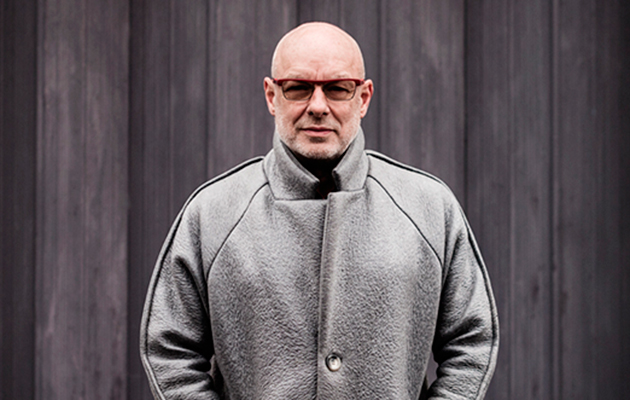
The Markov Chain Generator software reminds me a little of the Verbisizer programme you and Bowie used on Outside.
The point about these things is they’re pushing you somewhere your taste wouldn’t take you. A lot of the projects I enjoy – and David enjoyed – was to try to put yourself somewhere you wouldn’t slide into intuitively, that you wouldn’t comfortably reach. Then just try to see what it’s like. What happens if I’m there? What does that mean to be in that place? What David was doing was a kind of cut-up thing, like Burroughs, Bryon Gysin and so on used to do. See? We all come out of experimental art. He would cut up his bits and pieces that he’d found from books and so on, put them together in various ways – throw them together – and just take the bits he liked.
Is there a thread that links your collaborators like Bowie, Bryars, Byrne, Fripp, Cale…
It’s standing outside of music in some way. Looking at it and seeing it not only as something you love and you’re passionately engaged with but as a set of experiments you could do in other ways. If you broadly divide musicians up, you have the kind who are so into a style that’s what they do – nothing wrong with that, they’re great players. Fripp, by contrast, is someone who sits outside music and thinks, ‘You could do it differently. You could have a kind of music that goes like this…’ So he invents so new strange and very hard for most other people to play music style. John Cale is like that as well. And I’m like that.
What was the nature of your relationship with Bowie?
We got on well, I think, because we were both interested in that kind of experiment. It isn’t to say that makes for a superior musician, or anything like that. It isn’t to do with superiority. It’s to do with what you’re making music for, what your intentions are, what do you want to find from music? I think what David wanted to find – and what I like finding – was other ways of approaching the problem of how you make decisions. How do I arrive at decisions? Do I do it entirely by intuition; that feels nice, that feels right. That’s not a bad way but it doesn’t always lead you anywhere. Sometimes you have to break out of that intuition circle.
With Lou and David no longer with us, who do you consider your peers?
That’s a difficult question. I didn’t really even see them as my peers. Well, David more than Lou. I’ve never really felt I had close kinship with any other artist. There are a lot of artists I like and get on well with. Part of the thing is I don’t just do music. My closest friendships are with Jon Hassell is somebody who I would say I’ve had a long intellectual connection with, but I don’t make the same music as him, and Danny Hillis, who’s a scientist. I’ve always thought how wonderful it would be to belong to a group like Der Blaue Reiter or Le Six, those artistic groups, the Dadaists, the Suprematists. There isn’t a thing that I can belong to at the moment.
Apart from your intrinsic Brian Enoness?
But that’s a club of one!
You said there have been many Brian Enos down the years. Maybe you could find a way to gather them all together?
Yes! Get somebody to be the Brian Eno of 1975, and someone else to be 1980…



